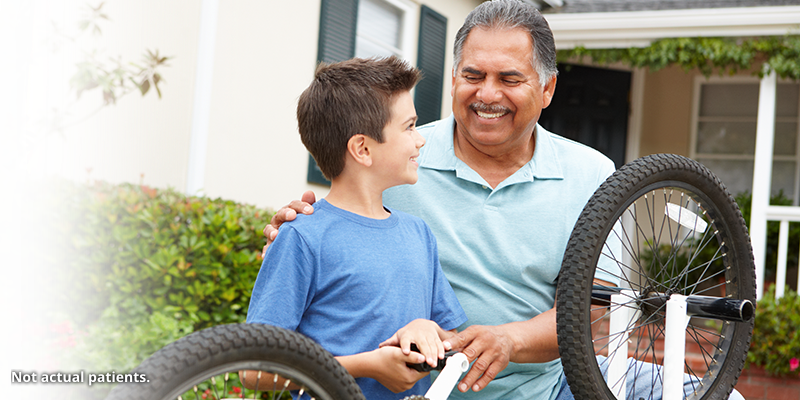
TIPS FOR LIVING WELL
WITH MULTIPLE MYELOMA

Self-care is important for your health
It’s important to make yourself a priority and do good things just for you, like maintaining healthy eating habits and relieving stress. You should discuss your self-care plan with your care team to make sure that it works best for you and your goals.

Stay active
Regular physical activity can help your body adapt to the challenges of multiple myeloma. You can and should still enjoy the activities you love most

Plan ahead
Create a plan and set reminders when each medication needs to be taken so you can make the most out of each day. Remember to pack your medication (and snacks if needed) while traveling or when you’re out for the day.

Stick with it
Make every effort to stay on treatment according to the plan set by your healthcare provider. Creating a routine can help you stay on treatment. It can be as easy as taking your meds at the same time each day to help you remember.
Try to relieve stress
It’s normal to feel stress while undergoing treatment for multiple myeloma. Managing stress with multiple myeloma can be challenging, but taking a few minutes every day to do something you enjoy can help you feel more relaxed.
Practice good nutrition
Maintaining healthy eating and drinking habits are an important part of multiple myeloma self-care. Work with your care team to formulate a nutrition plan that is best for you. These tips may help you optimize your nutrition
- Since multiple myeloma can make your immune system weaker, you may wish to avoid any foods that could make you sick, such as raw meat or fish, runny eggs, unpasteurized drinks, sushi, and unwashed fruits and vegetables
- Eat small and frequent meals throughout the day. This can help your body get enough calories and nutrients without making you feel nauseous
- Stay away from spicy or fried foods that might upset your stomach
- Choose blander foods with milder odors, like cheese, crackers, yogurt, or pasta
- Work in high protein foods to help your body's cells, tissues, and immune system recover
- Include whole grains to maintain a good energy level
- Add a variety of antioxidant-rich fruits and vegetables each day
- Eat healthy fats, like avocado, nuts, seeds, or olive oil
- Limit added sugars
- Drink plenty of water and avoid too much caffeine
Takeda Oncology
Here2Assist® patient support
We’re here for you throughout your treatment.